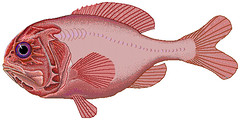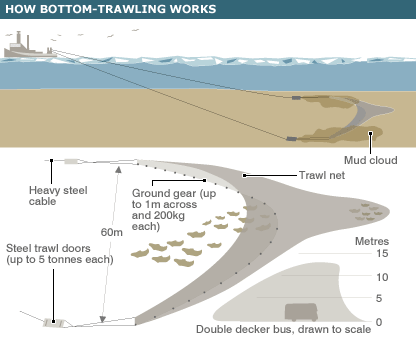tags: Orange roughy, South Pacific Ocean, conservation, trawling
Last month, leading scientists warned there would be no marine fish left in 50 years if current oceanic fishing practices continued unchanged. This month, thanks to an agreement reached by more than 20 South Pacific Nations in the coastal town of Renaca, Chile, one quarter of the world's oceans will be protected from the destructive fishing practice of trawling. The agreement will go into effect on 30 September 2007.
Trawling is a method of fishing where large heavy nets are dragged across the sea floor, capturing or destroying every living thing in their path by scraping the sea floor clean and by suffocating nearby marine life under clouds of sediment. Trawling effectively transforms a once rich and thriving sea floor into an ecological desert.
The oceanic area that will be protected is the last pristine deep-sea marine environment in the world, extending from the Equator to the Antarctic and from Australia to the western coast of South America.
"This area contains thousands of underwater sea mountains, or seamounts, that are considered to be some of the most ecologically rich habitats in the world,'' said Joshua Reichert, director of the private Pew Charitable Trusts' environment division, which coordinated the groups' campaign. "For all of us, this really represents a major step forward for marine conservation.''
 Orange roughy, Hoplostethus atlanticus (pictured), is the main commercial fish in the South Pacific high seas, primarily caught by New Zealand fishing vessels. Orange roughy are large, slow-growing benthic fishes that are thought to live 150 years or more. They subsist on a diet of prawns, fish and squid, and are late to mature: they do not breed until they are 25-30 years old, thereby replenishing their numbers only very slowly.
Orange roughy, Hoplostethus atlanticus (pictured), is the main commercial fish in the South Pacific high seas, primarily caught by New Zealand fishing vessels. Orange roughy are large, slow-growing benthic fishes that are thought to live 150 years or more. They subsist on a diet of prawns, fish and squid, and are late to mature: they do not breed until they are 25-30 years old, thereby replenishing their numbers only very slowly.
Orange roughy are caught by trawlers while they gather around seamounts to spawn. After a peak catch of 54,000 tonnes in 1988/89, the orange roughy catch has consistently decreased each year due to overfishing. Current estimates of the New Zealand fishing trade range up to about $10 million.
The delegation from New Zealand, whose fishermen are responsible for 90% of bottom trawling in the South Pacific high seas, complained that the agreement's restrictions would "severely constrain" its fishing vessels. However, because the ecological costs of trawling are far greater than economic setbacks, conservation groups were pleased with these contraints.
"This is a major step forward in the protection of biodiversity on the high seas," said Matthew Gianni, a spokesman for The Deep Sea Conservation Coalition, an alliance of leading environmental and conservation groups.
According to the agreement, observers and ship locator monitoring systems will be used to ensure compliance, and vessels must remain at least five nautical miles from deep-water corals and other vulnerable marine ecosystems.
This agreement was made among members of the fledgling South Pacific Regional Fisheries Management Organization: Australia, Canada, Chile, China, Colombia, Cook Islands, Ecuador, the European Commission, Federated States of Micronesia, France, Japan, New Zealand, Niue, Palau, Papua New Guinea, Peru, Russia, South Korea, Ukraine, the United States and Vanuatu.
Sources
BBC News (quotes, trawling image)
Guardian (quotes)
- Log in to post comments


Well, it's nice to see somebody doing SOMETHING...
I agree,Diva - Good news has been rare!!
This is amazing.
Though I don't understand why this hasn't been on the main news channels, good news is sometimes hard to find
Then again, probably they could reach agreement because their wasn't a scrum of news hounds making ill informed comments.
Dissappointing to see the supposedly enlightened New Zealands fisherman whinging about being constrained. That's the purpose folks! Should the oceans be destroyed to keep you in a job? Yes I realise that I currently eat the fish you trawl ... but I'm not going to lobby to force fish onto the menu if it goes away. I'll just accept it and move on.
First thing, this type of news must come in main headlines. Secondly this is a real nice step taken to protect the very fast depleting wild stocks. But I feel it will be difficult to enforce this law, there are so many reasons for that. It will be good if all the countries pledge to do the same. For some time may be we will be getting less fish, or at higher prices but slowly we will move on to alternate source like aquaculture.
Oceana would like to applaud The Deep Sea Conservation Coalition and everyone else from the 20 nations who worked so hard for the agreement to be put into place. This is a big step towards the conservation of our oceans. Lets hope this sets a precedent for other nations to protect their oceans as well.
Ben Chisholm
Oceana